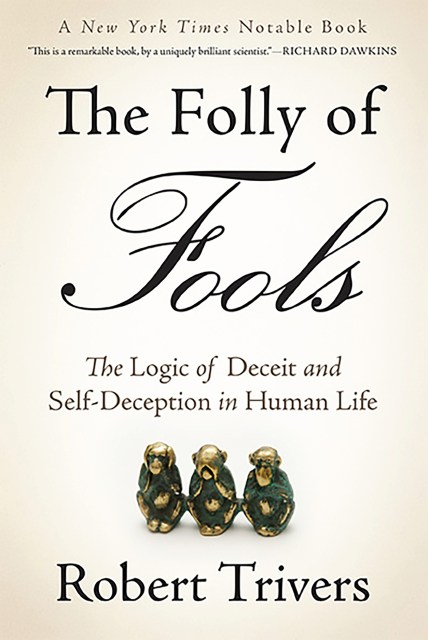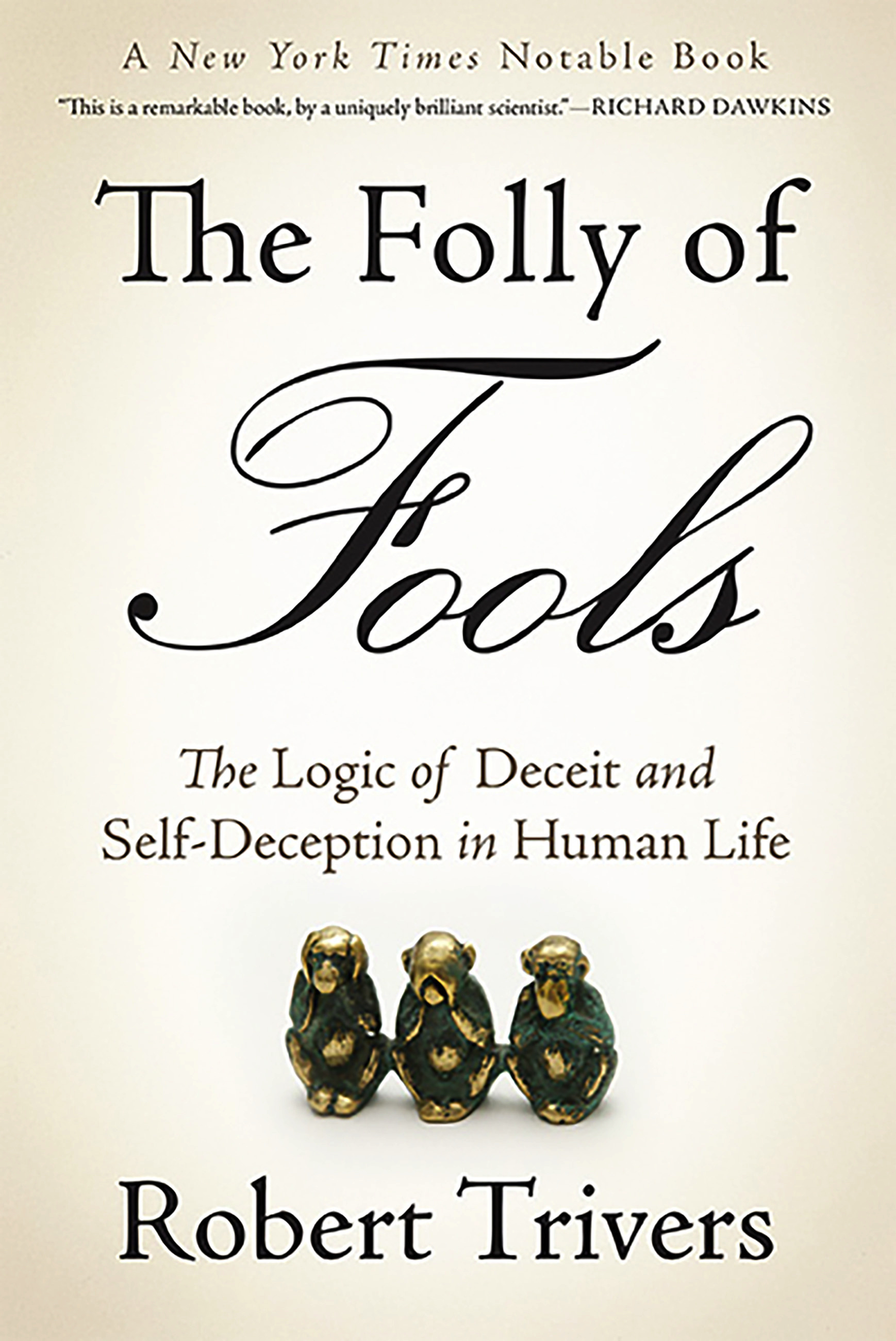Promotion
Use code BESTBOOKS24 for 25% off sitewide + free shipping over $35
By clicking “Accept,” you agree to the use of cookies and similar technologies on your device as set forth in our Cookie Policy and our Privacy Policy. Please note that certain cookies are essential for this website to function properly and do not require user consent to be deployed.
The Folly of Fools
The Logic of Deceit and Self-Deception in Human Life
Contributors
Formats and Prices
Price
$18.99Price
$23.99 CADFormat
Format:
- Trade Paperback $18.99 $23.99 CAD
- ebook $12.99 $16.99 CAD
This item is a preorder. Your payment method will be charged immediately, and the product is expected to ship on or around January 7, 2014. This date is subject to change due to shipping delays beyond our control.
Also available from:
In his bold new work, prominent biological theorist Robert Trivers unflinchingly argues that self-deception evolved in the service of deceit — the better to fool others. We do it for biological reasons — in order to help us survive and procreate. From viruses mimicking host behavior to humans misremembering (sometimes intentionally) the details of a quarrel, science has proven that the deceptive one can always outwit the masses. But we undertake this deception at our own peril.
Trivers has written an ambitious investigation into the evolutionary logic of lying and the costs of leaving it unchecked.
Genre:
-
Boston Globe
“Trivers's knowledge of a range of disparate subjects is impressive.... Zooming in from the evolution of group interaction to the adaptations of neurology, Trivers writes in depth about how poor our brains are at grasping anything that could be considered an ‘objective' reality. We're constantly fooling ourselves.”
Financial Times
“[O]riginal and important.... [The Folly of Fools] is a remarkable book, thick with ideas, yet relaxed and conversational in tone. Perhaps most remarkable is how ruthlessly Trivers confronts his own self-delusions…. If we all examined our faults and foibles as honestly as Trivers does, the world probably would, as he hopes, be a more decent place.”
The Daily
“Fascinating”
Science
“Engaging.... Disarmingly honest.... Trivers's book is a thoroughly good read. If his well-informed by modest approach starts a new trend, then The Folly of Fools is a welcome and rather unselfish meme.”
-
Scientific American, Guilty Planet blog
“Trivers is one of the greatest thinkers of our time.... Folly of Fools takes a refreshingly critical look at human behavior.... To fix some of the world's follies, we should lower the shield and better understand deception and our own self-deception by absorbing the wisdom, risky ideas, and generous admissions of his own foolishness in Robert Trivers' Folly of Fools. The truth can hurt, but deceit can, too.”
Tyler Cowen, Marginal Revolution blog
“Brilliant, insightful, with occasional lapses of taste, quintessential Trivers, now the go-to book on its topic, recommended.”
Kai Kupferschmidt, Science
“[Trivers is] an immensely original thinker in biology. His strength has been to see conflict where other people see only harmony.... Whereas others see optimism and self-deception as a defensive strategy to stay sane and happy in a harsh world, he sees it as a psychological attack mechanism, ‘fooling yourself to better fool others,' he says.”
-
The Economist
“In The Folly of Fools Robert Trivers...explains that the most effectively devious people are often unaware of their deceit. Self-deception makes it easier to manipulate others to get ahead. Particularly intelligent people can be especially good at deceiving themselves. Mining research in biology, neurophysiology, immunology and psychology, Mr. Trivers delivers a swift tour of the links between deception and evolutionary progress.”
Psychology Today
“Read this if…You're hungry for assumption-challenging explanations for your everyday behavior. Well-articulated and convincing, Trivers's theory draws on group dynamics, neuroscience, and even immunology to explain why we're all liars. Ultimately, he concludes that we're best off sensing—and telling—the truth whenever possible.”
Salon
“[Trivers] probably knows more about the mechanics and meaning of deception than almost anyone else in the world, and his new book, The Folly of Fools, covers pretty much anything you'd want to know about the topic.... Expansive, smart and deep, the book—a relentlessly fascinating and entertaining read—will utterly change the way you think about lying.”
-
The Guardian (UK)
“After forty years of research Trivers wrote [The Folly of Fools] against the backdrop of a global economic meltdown caused by self-deceived, over-confident egoists grossly out of touch with reality, and when he explains how the human male drive for power and control correlates with ignorance and self-delusion, your blood runs cold.... [The Folly of Fools] is an exhilarating read: the intertwined issues of deceit and self-deception are infinite, involving positive and negative outcomes for the fool and the fooled—roles that can reverse and revert without your even knowing.”
Discover
“Weaving together examples from biology, psychology, history, and immunology, evolutionary theorist Robert Trivers argues that we deceive ourselves in order to better deceive others, and do so in order to survive, procreate, and generally get ahead.... [A] thoroughly researched, thought-provoking read.”
Nature
“[A] provocative and wide-ranging book.... Trivers touches on wide-ranging issues: the role of evolutionary biology in the social sciences; the placebo effect; lie detectors; genocide; the scientific method. But he conveys a powerful and focused message: if we can learn to recognize and fight our own self-deception, we can avoid negative consequences at levels from the individual to the national, and live better lives.” -
David Haig, Professor of Biology, Harvard University
“This is an enjoyable, thought-provoking book on how our mind systematically creates distorted perceptions of reality and how these distort our presentation of self to others. I believe the book is an important contribution to psychology and social science more generally and will undoubtedly stimulate debate on these important questions.”
Publishers Weekly
“[A] spirited, provocative exploration of the evolutionary logic of deceit and self-deception.... Stimulating...Trivers's study provides an energetic exploration of a perplexing human trait.”
BBC Focus
“By Trivers's own admission, many of these ideas are speculative. But even if he does suffer from over-confidence—a type of self-deception more common in males—the admirable breadth, clarity and ambition of the result more than vindicate nature's creation of the blind spot.”
-
David P. Barash, Evolutionary Psychology
“[I]t would be folly indeed to ignore the book's scientific insights, its provocative suggestions, and—perhaps most of all—the sheer intellectual delight in reading something that is so cogent, so relevant to one's own daily life, and, it must be said, so damned obvious … once a genius like Robert Trivers points it out! (Please note: I don't use the ‘g-word' often, or lightly.)”
Seattle Times
“If we can convince ourselves that we are stronger, smarter, more skillful, more ethical or better drivers than others, we're a long way toward convincing other people too. This fundamental insight frames Trivers' wide-ranging exploration of deceit and self-deception in the human and animal worlds…. Believing you can achieve some goal – climbing a mountain, getting a new job, rebuilding an engine – can give you the incentive to actually work at it. The trick, of course, is to not slide into overconfidence or blithely deny unpleasant facts – behaviors which, as Trivers shows time and again, almost always precede disaster.” -
Frans de Waal, C. H. Candler Professor, Emory University, and author of Our Inner Ape and The Age of Empathy
“Here a topic very few people think about, perhaps because the degree to which self-deception permeates our lives is itself subject to powerful denials. Robert Trivers, one of the brightest minds in evolutionary biology, leaves us little escape, however. No denying: an eye-opening read.”
William von Hippel, Professor of Psychology, University of Queensland
“Great books contain important new ideas, and this book is no exception. What makes Trivers' book unusual even among great books is the density of new ideas. Like other great popular press books in science, this book advances an important new idea in an entertaining and accessible manner. This book goes beyond that, however, by providing dozens of new hypotheses for those of us who have been laboring in this field for the last twenty years. In that sense, this book is not just exporting science to the lay public, but is also an important piece of scholarship.”
-
John Horgan, New York Times Book Review
“Trivers's scope is vast, ranging from the fibs parents and children tell to manipulate one another to the ‘false historical narratives' political leaders foist on their citizens and the rest of the world.... The Folly of Fools reminds me of other irreducibly odd classics by scientific iconoclasts.... May [Trivers's] new book give him the attention he so richly deserves.”
New York Times Book Review
“An intriguing argument that deceit is a beneficial evolutionary ‘deep feature' of life.”
Washington Post
“A celebrated evolutionary biologist, Trivers uses the tools of his trade to answer a basic question: Why are deception and self-deception so prevalent?.... The Folly of Fools assumes the unity of all nature and seeks to comprehend it not merely by observation and reason, but also by subjective impressions, intuition and imagination. And thus Trivers ranges across biology, anthropology, history and politics to find examples of deception and self-deception in action.” -
Richard Wrangham, Professor of Biological Anthropology, Harvard University, and author of Catching Fire: How Cooking Made Us Human
“The problem of why natural selection favors self-deception is as poorly understood as it is riveting. Robert Trivers uses examples from insects to international relations to guide us to the fundamental logic. The result is a startlingly original and important book that should start a global conversation on a topic of both scholarly and personal interest.”
Richard Dawkins, emeritus Professor of the Public Understanding of Science, University of Oxford, and author of The Greatest Show on Earth
“This is a remarkable book, by a uniquely brilliant scientist. Robert Trivers has a track record of producing highly original ideas, which have gone on to stimulate much research. His Darwinian theory of self-deception is arguably his most provocative and interesting idea so far. The book is enlivened by Trivers' candid personal style, and is a pleasure to read. Strongly recommended.”
-
Kirkus Reviews (starred)
“Self-deception has long been a dark, opaque side of our behavior, but the author brings a bright flashlight to his investigation of why we alter information to reach a falsehood.... Trivers examines our biases and rationalizations, denials and projections, misrepresentation and manipulations, and his writing is comfortable and suasive, resulting from his familiarity and command of the subject's broad application and investigative history.... A gripping inquiry. Trivers is informal but highly knowledgeable, provocative, brightly humorous and inviting.”
Library Journal
“Looking at self-deception in broader areas like war, religion, false historical narratives, and even plane crashes, Trivers presents a convincing argument for why this type of dishonesty is as harmful to the individual as it is to society as a whole.... This provocative book examines an often unexamined subject, but one with which all readers are familiar. Recommended for professional social scientists as well as readers of popular science.”
- On Sale
- Jan 7, 2014
- Page Count
- 416 pages
- Publisher
- Basic Books
- ISBN-13
- 9780465085972
Newsletter Signup
By clicking ‘Sign Up,’ I acknowledge that I have read and agree to Hachette Book Group’s Privacy Policy and Terms of Use







